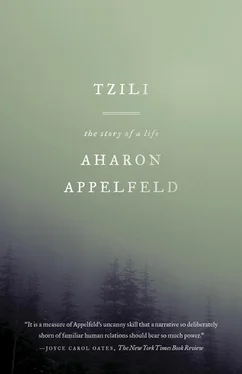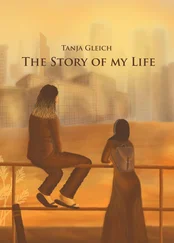“I was looking for you.”
“You won’t find me there. I keep as far away as possible from them.”
“Where are you?”
“Setting sail.”
“Where to?”
All at once a flock of birds rose into the air and crossed the darkening horizon, and Tzili understood that he had only called her in order to take his leave.
She put the haversack down on the snow. Her eyes opened and she said: “My search was in vain.” It was her own voice which had come back to her.
“So you’re abandoning me to the refugees, those bad, wicked people.” A voice that had been locked up inside her broke out and rose into the air. “I’m asking you a question. Answer me. If you don’t want me, tell me. I’m not complaining. I love you anyway. I’ll make you herb tea if you like. The mountain is unoccupied. It’s waiting for us. There’s no one there; we can go back to it. It’s a good mountain, you said so yourself. I’ll go to the village and bring back supplies, I won’t be lazy. You can believe me. Don’t you believe me?”
After this she sat for hours next to the haversack. She woke up and fell asleep again, and when she finally rose to her feet brown vapors were already rising from the valleys. Here and there a peasant stretched himself as if after a long sleep. There were no refugees to be seen.
“So you’re abandoning me,” the old anger flickered up in her again. It wasn’t really anger, but only a weak echo of anger. She was with herself as if after a long hunger. She narrowed her eyes and stroked her belly, and then she said to herself: “Mark’s probably not allowed to leave, for the time being. Later on, they’ll let him go. He’s not his own boss, after all.”
The snow thawed and the first convoys of refugees poured down the hillsides. Strange, thought Tzili, the war’s over and I didn’t know. Mark must have known before me; he must be happy now. Suddenly she felt that her life was moving toward some other destination, where the colors were different. She heard the voices of the refugees, and the sound was so familiar that it hurt her.
She thought that she would go to the high mountain where she had first met Mark. She set her steps in that direction but the road was covered with mud and she gave up. Later, she said to herself.
Afterward the commotion died down and the lips of the land could be heard quietly sucking all over the plains. The liquids were being absorbed into the earth.
“Thank you, Maria,” said Tzili. “Thanks to you I’m still alive. But for you I would already be in another world. Thanks to you I’m still here. Isn’t it strange that thanks to you I’m still here? I’m grateful to you, Maria.” Tzili was surprised by the words that came out of her mouth.
She let the memory of Maria flow over her for a moment, and as she did so she saw her figure emerge from the mist and stand solidly before her eyes. A tall, strong woman dressed with simple elegance. When she came into her mother’s shop she filled it with the breath of city streets, cafés, and theaters. She never hid her opinions. She would often say that she was fond of the Jews, although not the religious ones. Those she had always hated, but the freethinking Jews who lived in the city were men after her own heart. They knew what civilization meant; they knew how to get the most out of life in the city. Of course, her appearances would always be accompanied by a certain fear, because of her connections with the provincial officials, the tax collectors, the police, and the hospitals. And when her daughters grew up, the circle of her acquaintances was enlarged. Not without scandals, of course.
And when Tzili’s brother got one of her daughters into trouble, Maria’s tone changed. She threatened them brutally, and in the end she extorted a tidy sum. Tzili remembered this episode too, but she felt no resentment. A proud woman, she concluded to herself.
Katerina, with whom she had spent two whole seasons, had often used this combination of words— a proud woman . Katerina too, Tzili now remembered with affection.
And while Tzili was standing there in a kind of trance, the refugees streamed toward her in a hungry swarm. She wanted to run for her life, but it was too late. They surrounded her on all sides: “Who are you?”
“I’m from here.” At last she found the words.
“And where were you during the war?”
“Here.”
“Can’t you see?” One of the refugees interrupted. “She’s afraid.”
“And you weren’t in any of the camps?”
“No.”
“And no one gave you away?”
“Can’t you see?” The same man intervened again. “She doesn’t look Jewish. She looks healthy.”
“A miracle,” said the questioner and turned aside.
The news spread from one to the other but it made no impression on the refugees.
Later on Tzili asked: “Did you see Mark?”
“What’s his last name?” asked a woman.
Tzili hung her head. She did not know.
The cold spring sun exposed them like moles. A motley crew of men, women, and children. The cold light showed up their ragged clothes. The convoy turned south and Tzili went with them. No one asked, “Where are you from?” or “Where are you going?” From time to time a supply-laden cart appeared and the people swarmed over it like ants. The familiar words from home now sounded wild and foreign to her. The refugees did not appear contented with anything. They argued, laughed, and fought, and at night they fell to the ground like sacks.
“What am I doing here?” Tzili asked herself. “I prefer the mountains and the rivers. Mark himself told me not to go with them. If I go too far, who knows if I’ll ever find him?”
From here she could still see the mountain where Mark had revealed himself to her, illuminated in the cold evening light. Now the bunker was ruined and the wind blew through it. Her voice broke with longing. No memory stirred in her, only a thin stream of longing flowing out of her toward the distant mountaintop. The calm of evening fell upon the deserted ranges and she fell asleep.
THEY MADE THEIR WAY southward. The peasants stood by the roadside displaying their wares: bread, vodka, and smoked meat. But the refugees walked past without buying or bartering. Suffering had made them indifferent. But Tzili was hungry. She sold a garment and received bread and smoked meat in exchange. “Look,” said one of the survivors, “she’s eating.”
Now she saw them from close up: thin, speechless, and withdrawn. The terror had not yet faded from their faces.
The sun sank in the sky and the crust of the earth dried up. The first ploughmen appeared on the mountainsides next to the plains. There were no clouds to darken the sky, only the trees, and the quietness.
They moved slowly through the landscape, looking around them as they walked. They slept a lot. Hardly a word was spoken. A kind of secret veiled their faces. Tzili feared this secret more than the dark nights in the forest.
A convoy of prisoners was led past in chains. From time to time a soldier fired a shot into the air and the prisoners all bent their heads at once. No one looked at them. The survivors were sunk into themselves.
A man came up to Tzili and asked: “Where are you from?” It wasn’t the man himself who asked the question, but something inside him, as in a nightmare.
Tzili felt as if her eyes had been opened. She heard words which she had not heard for years, and they lapped against her ears with their whispers. “If I meet my mother, what will I say to her?” She did not know what everyone else already knew: apart from this handful of survivors, there were no Jews left.
The sun opened out. The people unbuttoned their damp clothes and sprawled on the riverbank and slept. The long, damp years of the war steamed out of their moldy bodies. Even at night the smell did not disappear. Only Tzili did not sleep. The way the people slept filled her with wonder. A warm breeze touched them gently in their deep sleep. Are they happy? Tzili asked herself. They slept in a heap, defenseless bodies suddenly abandoned by danger.
Читать дальше












